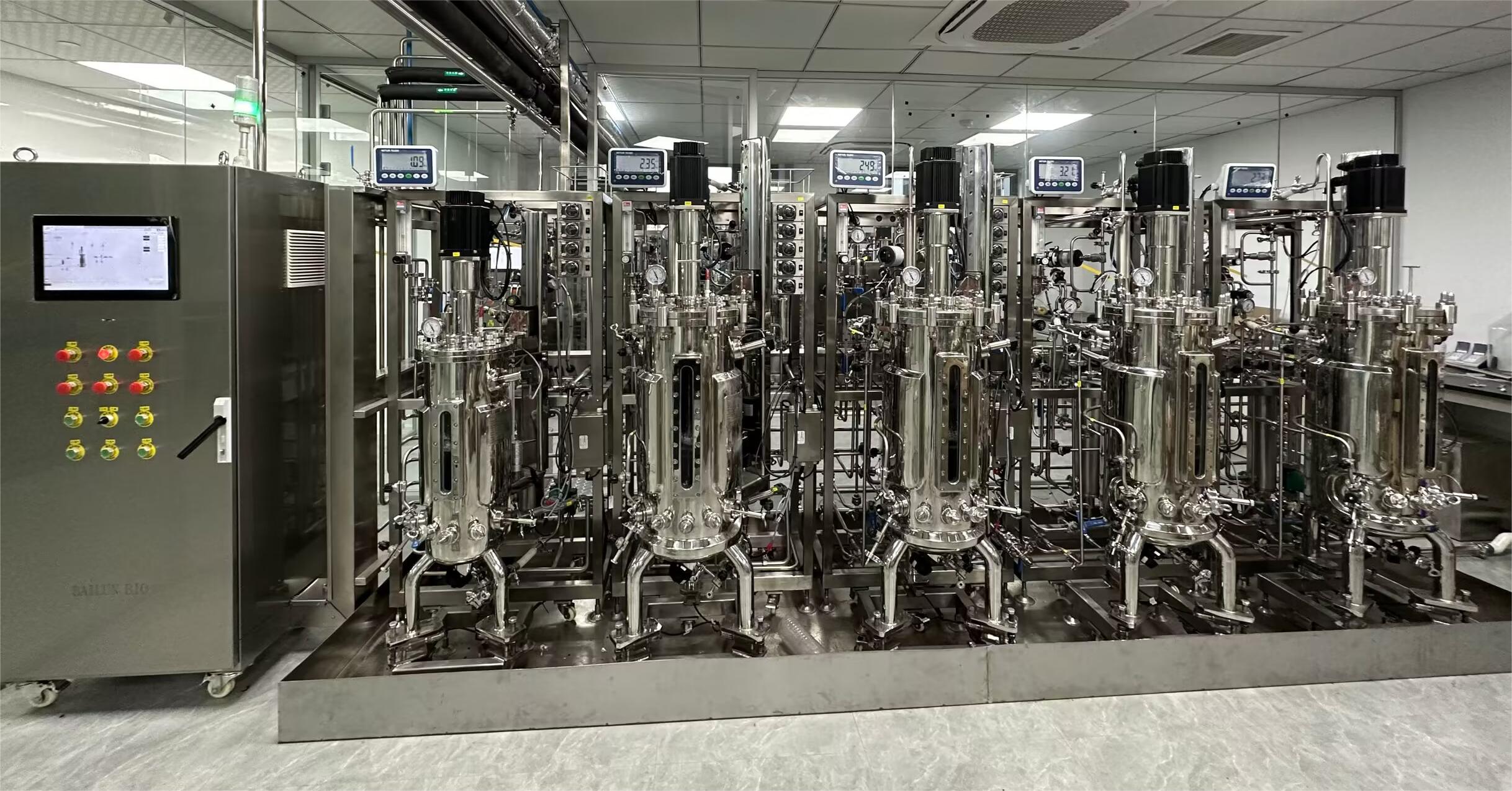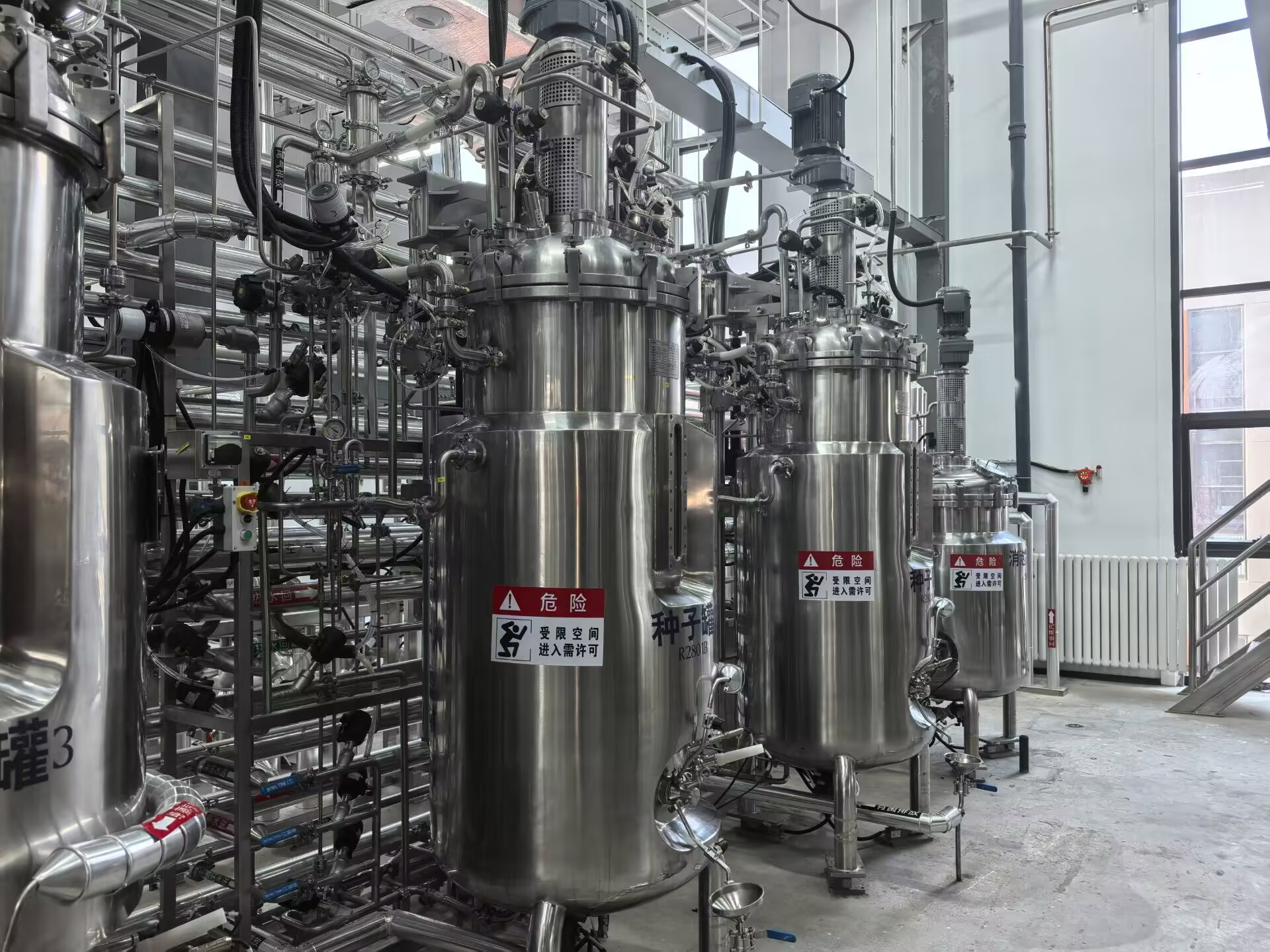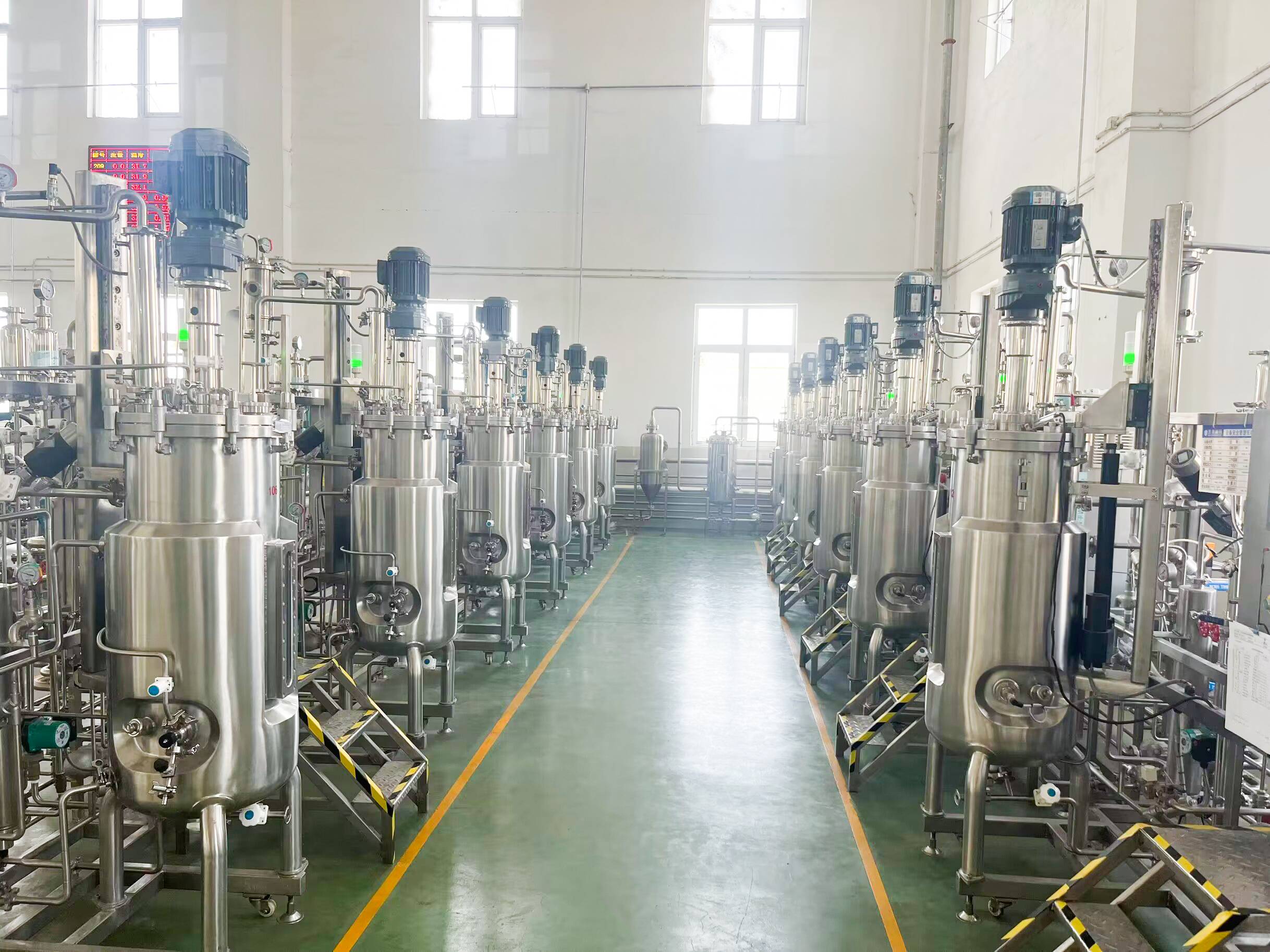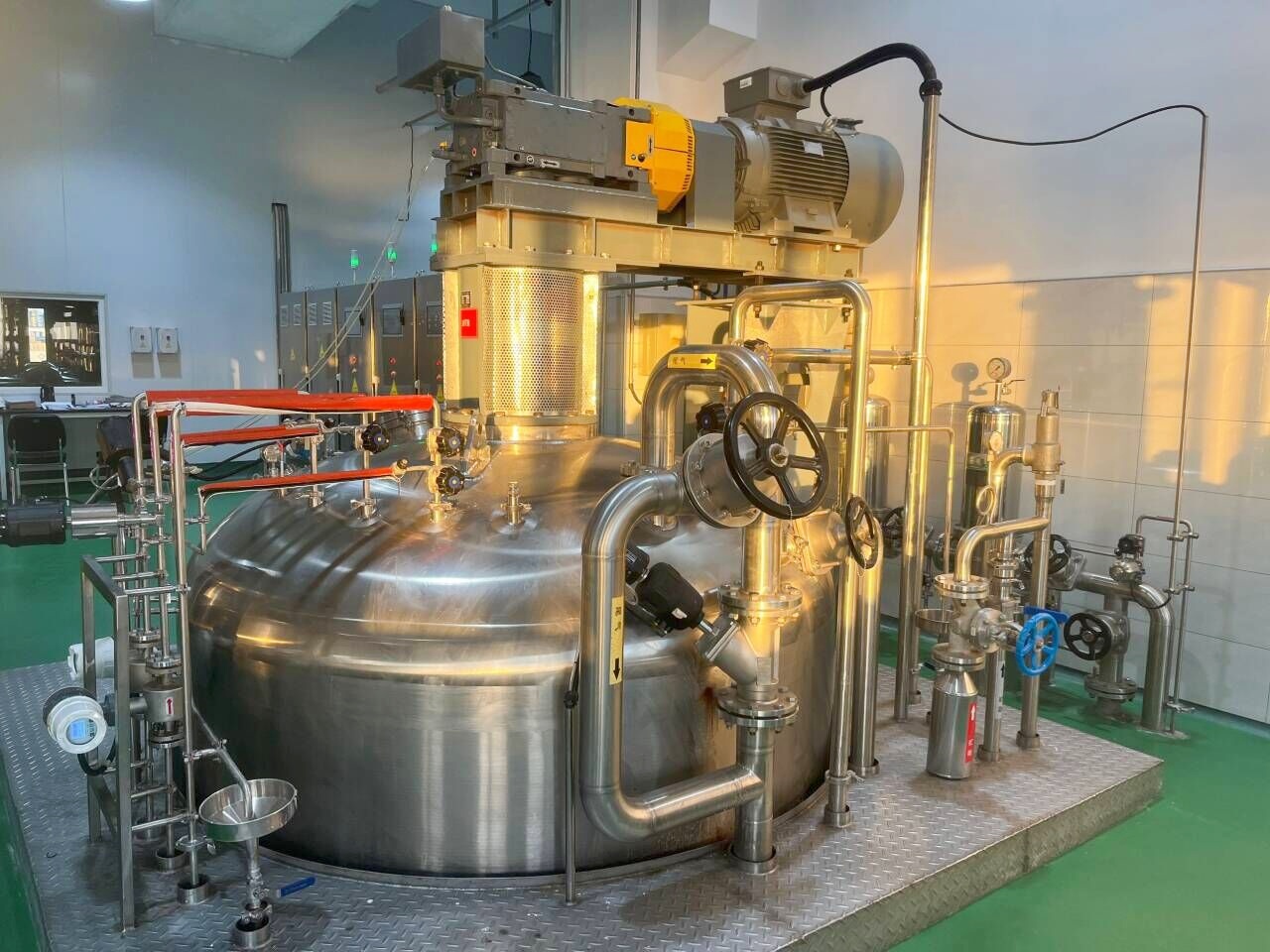Fermenter/Bioreactor
- Mini Glass Fermenter
- Lab and Pilot Scale Fermenter
- Pilot and Production Scale Fermenter
- Multi Stage Stainless Steel Fermenter
- Magnetic Stirring Fermenter
- Solid State Fermenter
- Enzyme Bioreactor
- Cell Culture Fermenter
- Vaccine Production Fermenter
- Inactivation Tank
- Mixing Tank Ingredients Tank
- Airlift Fermenter
- Spray Dryer
- Glass Bioreactor
- Multistage Glass Fermenter
- Light(photo) Fermenter
- Centrifuge
- blog
General Info
A report by Grand View Research estimates that the alternative protein market, which is partly driven by precision fermentation, is growing at an exponential rate and is projected to top $290 billion by 2030. This growth reflects the increasing consumer demand for sustainable and ethically sourced food products — a demand that precision fermentation is uniquely positioned to meet.
Precise fermentation technology introduces a low-cost and scalable alternative for creating a wide range of food and beverage products. In this article, we will take a look at how precision fermentation economically benefits producers—as well as its overall economic contribution to the food and beverage industry.
Precision Fermentation: What is it?
Precision fermentation is next gen biotechnology that uses microorganisms – like yeast, bacteria or algae – to produce specific products with precision and control. Unlike traditional fermentation where microorganisms grow naturally and often unpredictably, precision fermentation uses genetic engineering and manipulation of microbial metabolic pathways to produce specific compounds. This gives you more consistency and purity in the final product and much higher efficiency in the process.
At its core precision fermentation is about controlling the fermentation environment to get the desired outputs, so you have control over everything. This means food producers get high quality products, minimal byproducts and higher yield and efficiency.
Precision Fermentation Benefits
● Controlled Bioprocessing: Precision fermentation has more control than traditional methods. Engineered microorganisms to get specific outputs, minimal byproducts and waste.
● Targeted Genetic Engineering: By manipulating the microorganism’s genetic makeup precision fermentation can produce specific compounds like proteins, enzymes and flavours. So you get what you want.
● Higher Yield and Efficiency: Precision fermentation gives higher yields and shorter production cycles than traditional fermentation so producers can reduce costs and maintain quality.
● Less resource intensive: Traditional farming and food production uses huge amounts of land, water and energy, precision fermentation can get similar or better with less.
Traditional vs Precision Fermentation
Let's take a close look at major differences between Traditional Fermentation and Precision Fermentation:
Aspect | Traditional Fermentation | Precision Fermentation |
Process Control | Less control over byproducts | Highly controlled, targeted outcomes |
Microorganisms Used | Natural strains | Engineered strains |
Production Yield | Variable yields | Higher yields with specific targets |
Time Efficiency | Longer fermentation periods | Faster production cycles |
With this level of control in precision fermentation food producers can manage resources better and produce more products with higher quality. This controlled and engineered approach allows for production of foods with better texture, flavor and nutritional profiles. So producers can scale up more and maintain higher product quality.

Economic Benefits of Precision Fermentation in Food
Precision fermentation is changing the economic landscape of food production. With the ability to make plant-based dairy alternatives, cultured meat, and specialty enzymes without traditional farming, precision fermentation has big economic benefits. These are cost savings, more product innovation, & sustainability across the supply chain.
1. Lower Cost
One of the biggest economic benefits of precision fermentation is the cost savings. By having control over the fermentation process, precision fermentation allows producers to optimize, increase yields and repeatability of each batch. These process efficiencies mean lower cost per unit produced so companies can price competitively and maintain high quality product.
Some of the ways precision fermentation helps with cost savings are:
● Higher yields: By optimizing microbial strains and fermentation conditions, producers can get more output per batch, less raw materials and energy.
● Less raw materials: For example in plant-based dairy alternatives or cultured meat, precision fermentation eliminates the need for expensive animal derived proteins by using engineered microorganisms to produce the desired ingredients.
● Less waste: The controlled environment means less byproducts and waste, more efficiency per unit produced.
This is especially important in an age of commodity price volatility where traditional food production is highly dependent on raw material costs. By reducing land and animal inputs precision fermentation allows companies to maintain stable costs which means better profit margins.
2. New Food Ingredients
Precision fermentation allows for the creation of entirely new food ingredients that were previously impossible to make through traditional methods. As consumers move towards healthier, sustainable and plant-based options food producers are turning to precision fermentation to meet this trend. This can serve the growing markets for plant-based meats, dairy alternatives and clean label additives and give companies a competitive edge in a fast changing industry.
Examples include:
● Animal-free dairy proteins: Whey and casein, traditionally sourced from cows, can now be made by engineered microorganisms, a sustainable and ethical alternative to animal dairy.
● Cultured meats: Products that taste, texture and nutritionally match traditional meat but without the environmental and ethical issues of livestock production.
● Specialty enzymes: Enzymes critical in food processing can be made through precision fermentation, cleaner and more efficient production without the need for synthetic chemicals.
These products not only meet consumer demand but also let food companies differentiate themselves in a crowded market. As more companies invest in precision fermentation they can develop high quality, sustainable products that meet consumer trends and regulatory changes.

3. Sustainability
Precision fermentation is a more environmentally friendly way of food production compared to traditional methods, it consumes less resources. Traditional farming especially for animal based products requires vast amounts of land, water and energy, all of which adds to the environmental cost of food production. Precision fermentation reduces the need for large agricultural land and livestock farming, uses less natural resources to produce the same if not more.
Some of the sustainability benefits are:
● Resource efficiency: Less land, water and energy is required to produce ingredients as the process happens in a controlled and contained environment, no need for large scale farming.
● Lower greenhouse gas emissions: By eliminating the need for livestock farming which is one of the biggest contributor to global emissions, precision fermentation reduces the carbon footprint of food production. This makes it a more sustainable way to produce plant based and cultured meat products.
● Waste reduction: Precision fermentation can generate less byproducts and waste compared to traditional food production, a cleaner and more sustainable process.
For example a leading plant based dairy company that transitioned from traditional dairy sourcing to precision fermentation for whey protein saw:
● 40% reduction in raw material cost due to lower cost of producing whey protein through fermentation.
● 30% reduction in water usage, huge water savings in production.
With these savings and cost reduction the company was able to increase its profit margins and strengthen its position as an eco brand in the market. The move to precision fermentation was profitable and also made the company a sustainable and responsible option for consumers.
Economic Benefits of Precision Fermentation in Beverage Industry
As precision fermentation is changing the food industry it’s also having an impact on the beverage industry. By producing bio-based ingredients, flavour enhancers and alcohol free beverages precision fermentation offers a lot of economic, quality and sustainability benefits to beverage manufacturers. These innovations reduce costs and help businesses meet the growing consumer demand for consistency and eco-friendly products.
1. Cost Savings
One of the biggest benefits of precision fermentation in the beverage industry is the cost savings. Traditional beverage production processes like brewing and fermentation require large amounts of raw materials, energy and labour. Precision fermentation optimizes these inputs by using engineered microorganisms to produce specific compounds more efficiently.
How precision fermentation saves costs:
● Raw material costs: By using engineered microbes to produce the ingredients, manufacturers can reduce their reliance on expensive raw materials used in traditional beverage production, such as fruits, grains and animal derivatives.
● Energy efficiency: Traditional brewing processes can consume a lot of energy for heating, cooling and fermenting. Precision fermentation optimises energy usage, so less utility bills.
● Labour efficiency: Automation and control systems reduce manual labour, so less overhead costs and less human error.
This cost saving is especially important in competitive markets where price sensitivity is key. Beverage manufacturers can pass these savings on to the consumer, offer products at a lower price point and still maintain quality and increase profitability.
Precision fermentation gives beverage manufacturers a level of quality control that’s hard to get with traditional methods. One of the biggest challenges in beverage production, especially for large scale, is consistency across batches. Variability in raw materials, environment and fermentation time can result in differences in taste, texture and overall product quality and damage to brand reputation and consumer trust.
With precision fermentation, you can:
● Be uniform: By controlling fermentation conditions exactly, beverage producers can standardize the process and ensure every batch meets the same high standards.
● Reduce batch to batch variability: By controlling temperature, pH and nutrient levels, precision fermentation ensures each batch of beverage is consistent, reduces defects and improves product reliability.
● Increase customer satisfaction: Consistent product quality means higher customer satisfaction, more repeat business and brand loyalty.
For example, companies that produce kombucha or alcohol using precision fermentation can have the same flavour profile, fermentation level and overall quality across large volumes of production. This consistency is critical as manufacturers scale up to meet growing demand and still deliver a reliable and high quality product to the consumer.
3. Sustainability in Beverage Production
As sustainability becomes more important for companies and consumers, precision fermentation is a more sustainable way to produce beverages. Traditional brewing and fermentation methods can be resource hungry, needing lots of water, energy and land. Precision fermentation reduces the environmental impact of beverage production by being more resource efficient and reducing waste.
The sustainability benefits of precision fermentation in the beverage industry are:
● Less energy: Precision fermentation uses less energy than traditional brewing or fermentation methods. No heating and cooling cycles are needed, it’s more energy efficient.
● Less water: Traditional beverage production requires lots of water for irrigation, fermentation and cleaning processes. Precision fermentation reduces water consumption by optimizing processes and minimizing water waste.
● Waste reduction: Because precision fermentation processes are more efficient, they produce less waste and byproducts, it’s more sustainable. Engineered microorganisms can be designed to produce specific compounds, reducing the need for extra ingredients and minimizing environmental impact.
As consumers become more eco-aware, companies that use precision fermentation can tap into this growing audience. Companies that adopt sustainable practices and show commitment to eco-friendly production can differentiate themselves as leaders in the industry. This appeals to eco-conscious consumers and helps brands align with modern consumer values, and expand their market.
For example, a kombucha company switched to precision fermentation for flavor extraction and saw:
● 50% cost savings, mainly due to more efficient use of ingredients and energy.
● 20% improved product consistency, less product defects and more consistent flavor across batches.
This saved costs and helped the company attract eco-conscious consumers, in a already competitive market. By highlighting the sustainability of precision fermentation companies can position themselves as forward thinking, eco-friendly brands.
Best Fermenters for Precision Fermentation in Food and Beverage
Choosing the right fermenter is key to getting the most out of precision fermentation. Fermenters are suitable for small scale research or large scale production depending on the company’s needs. Below are two types of fermenters commonly used in both food and beverage industry.
Small Scale Production and Research
For small scale applications a laboratory scale fermenter, such as a lab glass bioreactor or shaker fermenter is perfect. These fermenters allow researchers to test different microbial strains and fermentation conditions, so they can optimize the process before scaling up to larger production volumes. Key features of small scale fermenters include:
● Versatility: Glass bioreactors for example offer clear visibility, so you can monitor fermentation conditions.
● Precision Control: Small scale fermenters give you precise control over temperature, pH and oxygen levels, critical for optimization.
● Scalability: Results from small scale experiments can be used to inform larger scale operations, so the transition to commercial production is smoother.

Large Scale Production
For large scale food and beverage production a pilot stainless steel fermenter is recommended. These fermenters can handle high volume production and are designed for commercial operations. Key features of large scale fermenters include:
● High Volume: These fermenters can hold volumes from hundreds to thousands of liters, perfect for large scale operations.
● Tough Construction: Made of stainless steel, these fermenters are easy to clean and hygienic.
● Automated Systems: Automated systems control fermentation conditions, for better product consistency and lower labor costs.
By choosing the right fermenter you can be more efficient, get higher yields and better product quality, all at lower cost.

Conclusion
In summary, precision fermentation is changing the food and beverage industry. With the ability to produce innovative ingredients like plant based proteins, cultured meats, and special enzymes—it opens up new markets and meets the growing consumer demand for eco friendly and ethically sourced products. Besides, precision fermentation brings economic benefits through higher yields, less waste and lower resource consumption as well. BaiLun Biotechnology’s advanced fermenters, including lab scale glass bioreactors and large scale stainless steel fermenters, provide the precision and control to optimize fermentation process. By integrating BaiLun’s fermentation technology into your production, you can ensure quality, maximize efficiency, and stay ahead of the curve. Contact us today for consultation and solutions.
